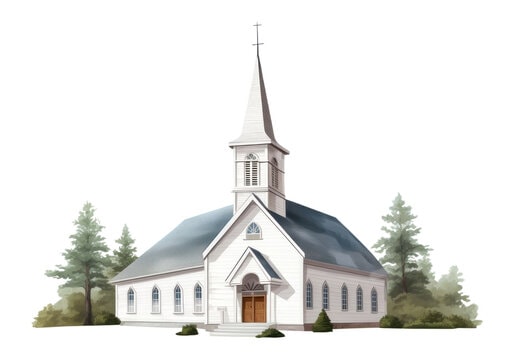Volunteers are the heart and soul of many church communities. They lead Sunday School classes, organize outreach programs, coordinate events, and help with maintenance around the church. Without their dedication and hard work, many church activities and services simply wouldn’t be possible.
However, as a church leader or administrator, it’s essential to recognize that while volunteers are often the lifeblood of your church, they’re also exposed to certain risks while serving. Whether they’re setting up for an event, driving church members to a retreat, or handling church property, there are potential liabilities that could arise. That’s why it’s crucial to ensure that your volunteers are properly covered by insurance.
In this post, we’ll guide you through the proper way to insure your church volunteers and help you understand the key insurance options you should consider.

1. Why Insurance for Volunteers is Important
Even though volunteers may not receive a paycheck, they still perform essential duties that come with risks. Injuries can happen, accidents can occur, or damage to property might take place. If someone is injured while volunteering, the church could be held liable for medical expenses, lost wages, or even lawsuits, depending on the circumstances.
Volunteers and church employees often work in environments where accidents can happen – from setting up heavy equipment for an event to driving church members to and from services. In these situations, it’s not just the volunteer or church employee at risk; the church can face significant financial and legal consequences as well.
2. Assessing Your Church’s Insurance Needs
Assessing your church’s insurance needs is a crucial step in protecting your organization from potential risks. Church leaders must consider various factors, including the size of the church, the number of members and volunteers, and the types of activities and events held. Here are some key considerations to help you assess your church’s insurance needs:
- Liability Insurance: Consider the types of activities and events your church hosts, such as worship services, youth groups, and community events. Liability insurance can help protect your church from lawsuits and financial losses in case of accidents or injuries.
- Volunteer Accident Insurance: If your church relies on volunteers, consider purchasing volunteer accident insurance to provide medical coverage in case of accidents or injuries.
- Property Damage: Assess the value of your church’s property, including buildings, equipment, and stained glass. Property damage insurance can help protect your church from financial losses in case of damage or destruction.
- Workers’ Compensation: If your church has employees, consider purchasing workers’ compensation insurance to cover medical expenses and lost wages in case of work-related injuries.
- General Liability: Consider the types of risks your church faces, such as slip-and-fall accidents or property damage. General liability insurance can help protect your church from financial losses in case of accidents or injuries.
- Insurance Agent: Work with an experienced insurance agent who understands the unique needs of churches and religious organizations. They can help you navigate the complex world of insurance and ensure you have the right coverage for your church.
- Insure Volunteers: Consider purchasing insurance to cover your church volunteers, including liability insurance and accident insurance.
- Medical Expenses: Consider the types of medical expenses your church may face, such as emergency medical care or long-term medical treatment. Insurance can help protect your church from financial losses in case of medical emergencies.
- Protecting Your Church: Assess the types of risks your church faces, such as theft, vandalism, or natural disasters. Insurance can help protect your church from financial losses in case of unexpected events.
- Purchase Insurance: Once you have assessed your church’s insurance needs, work with an insurance agent to purchase the necessary coverage. Make sure to carefully review your policy to ensure it meets your church’s unique needs.
By carefully assessing your church’s insurance needs, you can ensure your organization is protected from potential risks and financial losses. Remember to work with an experienced insurance agent and carefully review your policy to ensure you have the right coverage for your church.
2. Types of Insurance Coverage for Church Volunteers
There are several types of insurance that can help protect both your volunteers and your church. Here are some of the most common:
a. Volunteer Accident Insurance
This coverage helps cover medical expenses if a volunteer or church employee is injured while working on behalf of the church. It’s typically a secondary insurance, meaning it would kick in after the volunteer’s or church employee’s primary health insurance has been exhausted. Some policies may also cover lost wages if a volunteer or church employee is unable to work after an injury.
Why it’s important: Volunteer Accident Insurance can help reduce the financial burden on your church if a volunteer or church employee gets hurt while performing their duties.
b. General Liability Insurance
General liability insurance is essential for protecting your church against claims of bodily injury, property damage, or personal injury that could occur during church-sponsored activities. This coverage often includes injuries that occur on church property as well as incidents involving volunteers during off-site events or activities.
Why it’s important: Accidents can happen anywhere—whether it’s on the church campus or at a community outreach event. General liability insurance ensures that the church is financially protected in these cases.
c. Volunteer Driver Insurance
If volunteers are using their own vehicles to transport people to church events, retreats, or other activities, it’s important to have coverage in place. Many churches assume that a volunteer’s personal auto insurance policy will cover them in the event of an accident, but this may not always be the case. Having the proper insurance policy in place for volunteers who drive on behalf of the church can prevent costly claims.
Why it’s important: Protecting both the volunteer and the church when volunteers drive ensures that you are not exposed to liability in case of an accident.
d. Directors and Officers (D&O) Insurance
While D&O insurance is typically associated with the leadership of the church, it’s also important for protecting the volunteers who serve on the church’s board or leadership teams. D&O insurance covers the legal costs and expenses of volunteers (and paid staff) if they are sued for actions or decisions made in their official roles within the church.
Why it’s important: Volunteers serving in leadership roles need this coverage in case they face legal action for decisions made while serving the church.
e. Property Insurance
Property insurance protects the church’s physical assets, such as buildings, equipment, and supplies. It also covers damage caused by volunteers, like accidental breakages or mishandling of property. It’s important to ensure that your property insurance extends to cover events or activities that involve both volunteers and church employees.
Why it’s important: This ensures that the church isn’t left vulnerable in the event of accidental property damage or loss caused by a volunteer or church employee.

3. Steps to Properly Insure Your Volunteers
To ensure that your volunteers are properly insured, it’s important to take a structured approach. Below are the key steps you can follow to make sure your church is adequately protecting those who give their time and energy.
Step 1: Understand the Scope of Volunteer Activities
Before choosing the right insurance, take a deep dive into the variety of activities your volunteers and church employees are involved in. Are they volunteering at the church during regular services, or are they working offsite at outreach programs, missions, or retreats? The level of risk varies depending on whether they’re simply helping with administrative tasks or working in potentially hazardous environments like construction, event setup, or driving groups of people.
Tip: Create a detailed list of volunteer and church employee roles and responsibilities. This will help you determine what type of coverage each group needs.
Step 2: Review and Adjust Your Current Insurance Policies
Look at your existing church insurance policies, such as general liability, property insurance, and auto coverage, to ensure they provide adequate protection for both volunteers and church employees. Many churches assume their policies automatically cover volunteer activities, but that may not always be the case.
Check if the following areas need adjustment:
- General Liability Coverage: Does your general liability policy extend to cover volunteers and church employees in case of an accident or injury?
- Volunteer Drivers: Are volunteers who use their own cars for church activities adequately covered in case of an accident?
- Accident Insurance: Do you have coverage for medical expenses or lost wages if a volunteer or church employee gets injured?
Tip: Work with your insurance agent to ensure that your current policies include volunteer-specific and church employee-specific coverage and, if necessary, expand the scope of your insurance.
Step 3: Consider Specialized Volunteer Insurance
Many insurance providers offer specific volunteer accident insurance or volunteer coverage packages. These specialized policies fill in the gaps that general liability policies may leave behind, especially when it comes to personal injury or accidents that happen off church premises. Volunteer accident insurance is often designed to cover injuries sustained during volunteer activities, even if the volunteer is not actively working on church property.
If your church regularly hosts volunteers in physically demanding roles or high-risk situations (e.g., construction, driving), you may also want to look into policies that specifically cover those risks.
Tip: Specialized insurance for volunteers may be a cost-effective way to close coverage gaps and ensure comprehensive protection for both your volunteers and your church.
Step 4: Set Clear Policies and Safety Guidelines
Clear policies and guidelines not only help reduce risk but also provide a strong defense in case of an insurance claim. Implementing safety protocols, volunteer agreements, and training programs can help minimize accidents or misunderstandings about coverage.
For example:
- Require all volunteers to sign a release of liability or waiver form acknowledging the risks involved in their volunteer work.
- Develop and distribute a code of conduct or safety guidelines, especially for volunteers involved in higher-risk activities like driving or operating equipment.
Tip: Ensure that your policies are clearly communicated to all volunteers, and make safety a priority in all church activities. You might also consider offering training or orientation to new volunteers on best practices and safe behavior.
Step 5: Keep Records and Document Volunteer Activities
Documenting volunteer and church employee activities is essential not only for insurance purposes but also for ensuring that everyone is on the same page regarding responsibilities and potential risks. Maintain detailed records of volunteer and church employee shifts, roles, and any incidents or accidents that occur during their activities.
Tip: Use a volunteer management system or simple spreadsheets to track who’s volunteering, what they’re doing, and any injuries or claims made during their service. This documentation could be crucial if a claim arises.

4. Conclusion: Protecting Your Volunteers is Protecting Your Church
Volunteers are invaluable members of your church community, and it’s important to ensure that they are protected in case of accidents or incidents. Properly insuring your volunteers not only protects them, but it also safeguards your church from potential legal and financial risks.
By taking the time to assess your church’s insurance needs, speaking with your insurance provider, and implementing comprehensive coverage, you can ensure that your volunteers can continue to serve without the fear of being left unprotected.
If you’re unsure about your current coverage or want to make sure your church is fully protected, don’t hesitate to reach out to a trusted insurance professional. They can help you put the right policies in place so your church and volunteers stay safe and secure.
About the Meagher Agency
At The Meagher Agency, we’re here to help ensure that your church and volunteers are properly protected. Our team can guide you through the process of reviewing your insurance coverage, addressing any gaps, and finding the right solutions to meet your needs. Whether you’re looking for additional coverage for your volunteers or have questions about your current policies, we’re here to help. Contact us today to learn more about how we can support you and your church’s insurance needs.

